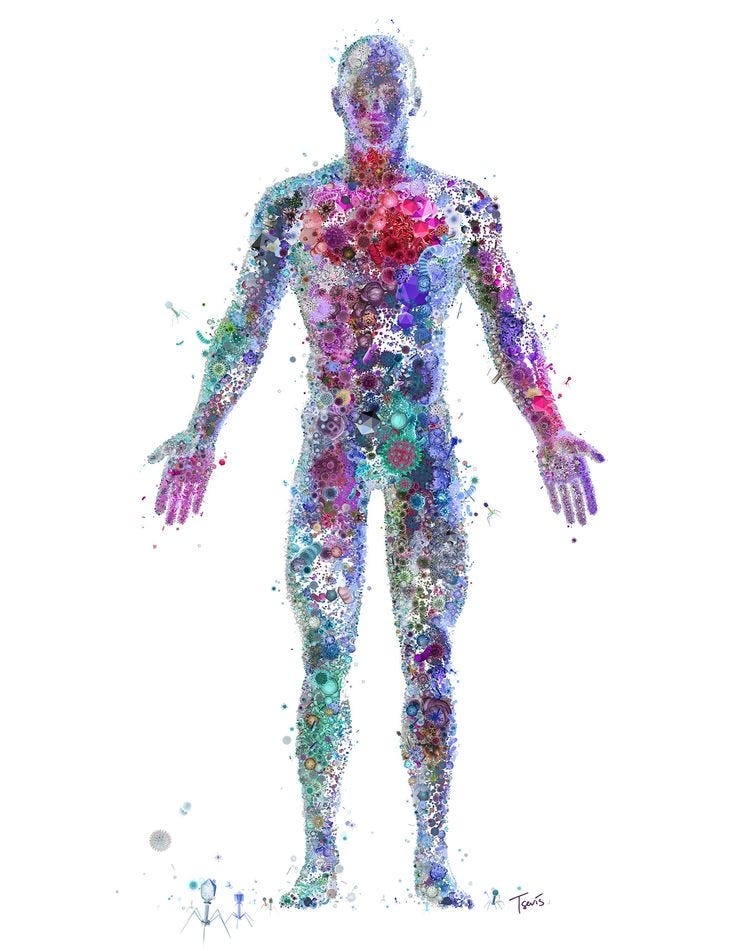The 5-Minute Body Scan That Stops Stress Before It Starts
Master the early warning system your body uses to prevent burnout, boost energy, and make better decisions
I used to think stress was just mental.
Tight deadline? Think harder. Difficult conversation coming up? Plan better. Overwhelmed by my to-do list? Just push through.
Then I learned that emotions aren't just thoughts floating in your head. They live in your body.
Your body constantly sends stress signals through physical sensations - tight shoulders, upset stomach, tension in your jaw. Most people ignore these early warnings until stress becomes overwhelming.
The Cost of Ignoring Physical Stress Signals
For years, I operated like a computer - all brain, no body awareness.
Despite career milestones and self-improvement efforts, something felt hollow. I couldn't fully enjoy victories or feel deeply connected.
The missing piece? I ignored physical stress signals that could have prevented:
Chronic burnout and overwhelm
Energy crashes that destroyed productivity
Decision fatigue from operating in constant stress mode
Journaling helped. Therapy helped. But mindfulness techniques targeting the mind-body connection were the real deal.
How Body Scan Meditation Transformed My Stress Response
The breakthrough came when I started body scanning - systematically tuning into physical sensations throughout my body.
This mindfulness practice delivered results within weeks:
Caught stress before it became overwhelming
Improved energy management dramatically
Recognized rest needs before hitting a wall
Complete Body Scan Meditation Guide: 5-Minute Technique
Master this evidence-based stress management method:
Step-by-Step Body Scan Instructions
Create Your Mindfulness Space
Find 5 quiet minutes, sit or lie comfortably
Remove distractions (phone, notifications)
Activate Relaxation Response
Inhale for 4 counts, exhale for 8 (repeat 3x)
This triggers your parasympathetic nervous system
Establish Mind-Body Connection
Place hand on heart, feel the rhythm
Ground yourself in present-moment awareness
Systematic Body Awareness Scan Notice sensations without judgment, moving from:
Head and jaw (common tension hotspots)
Neck and shoulders (stress storage areas)
Chest and arms (anxiety indicators)
Abdomen and back (emotional centers)
Hips and legs (grounding points)
Document Your Stress Patterns
Write down one discovery after each session
Track patterns to understand your unique stress signals
Practice this body scan meditation daily for one week and notice improvements in stress awareness and sleep quality.
Proven Benefits of Regular Body Scan Practice
Short-Term Stress Management Results (1-2 weeks):
Faster recognition of stress signals
Improved sleep quality and duration
Reduced physical tension and pain
Medium-Term Mindfulness Benefits (1-2 months):
Enhanced emotional regulation
Better energy management throughout the day
More confident decision-making under pressure
Long-Term Wellness Outcomes (3+ months):
Stronger mind-body connection and self-awareness
Proactive stress management before overwhelm hits
Greater overall well-being and life satisfaction
The Science Behind Body Scan Meditation for Stress Relief
Research shows body scan meditation effectively:
Reduces cortisol (primary stress hormone) levels
Improves emotional regulation and resilience
Increases interoceptive awareness (body signal recognition)
Supports better sleep quality and recovery
Your body constantly communicates through physical sensations. Most people ignore these stress signals until they become serious health problems.
In our screen-heavy, mentally demanding world, this 5-minute mindfulness practice often prevents hours of mental spinning and stress recovery.
Start Your Body Scan Meditation Practice Tonight
Your stress management challenge: Try one 5-minute body scan session before bed tonight. Notice what physical sensations you discover and how your sleep quality changes.
Share your experience - which body areas hold the most tension for you?
Until next week, Alex
P.S. Looking for more evidence-based stress management techniques? Reply and let me know what specific challenges you're facing.








On top of what you mention, I've been adding the "tense your muscles, then relax" part which I think was first researched for sports deep muscle relaxation.
It's working wonders and improved my neck tension